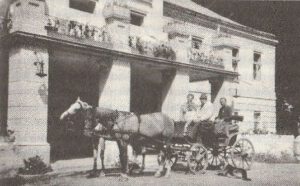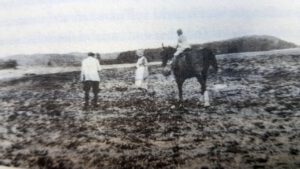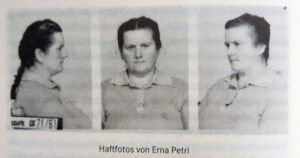– Text / Tekst in: Deutsch English Polski –
[DE] Erna Kürbs stammt aus einer Bauernfamilie aus dem Ort Herressen bei Weimar. Als Sechzehnjährige trifft sie 1936 beim Tanzen Horst Petri, einem fanatischen, aufstrebenden NS-Funktionär, der ihr vom Großdeutschen Reich und neuem Raum im Osten vorschwärmt. Ihr Vater ist gegen diese Verbindung. Als Erna ein Jahr später schwanger wird, heiratet sie mit Genehmigung des Rasse- und Siedlungshauptamtes. Eine „rassisch wertvolle“ junge Bauerstochter als Ehefrau eines SS-Offiziers passt in das Konzept der Nazis.
read more/ Czytaj więcej >
Im Juni 1942 trifft Erna Petri mit ihrem dreijährigen Sohn auf Grzenda ein – einem früheren polnischen Gutshof, das jetzt ihr Mann Horst als SS-Gut leitet. „Das Herrenhaus mit seinen weißen Säulen lag inmitten sanfter Hügel und Wiesen und bot einen wunderbaren Ausblick auf die umliegenden Dörfer … Man kann sich gut die Erregung und den Stolz vorstellen, die Erna Petri verspürte, als sie in diesem beeindruckenden Haus ankam, das in deutlichem Kontrast zu dem bedrückenden Hof zu Hause in Thüringen stand.“ (Lower, S. 170f.)
Sie kann jetzt als Gutsherrin schalten und walten. Häufig kommt Besuch, vor allem von SS- und Wehrmachtsoffizieren, die sich in ihr Gästebuch eintragen. Besonders geehrt fühlt sie sich durch die Besuche der Frau des berüchtigten SS- und Polizeiführers von Galizien, Fritz Katzmann. Erna ist jetzt wer. Das Ehepaar Petri behandelt seine Tiere besser als die Menschen. Horst Petri nimmt Erna auf Treibjagden auf entflohene jüdische Häftlinge mit. Ein ukrainischer Landarbeiter sieht, wie sie bei einer dieser Treibjagden zwei nackte jüdische Männer hintereinander erschießt. Zwei weitere Leichen befinden sich auf ihren Weg, die wahrscheinlich auch von ihr erschossen wurden. Als ihr Mann nicht auf dem Gut weilt, erschießt sie allein sechs jüdische Kinder.
Nach dem Krieg leben Horst und Erna Petri unauffällig in der DDR, bis sie durch einen Zufall entdeckt werden. Horst Petri wird zum Tode verurteilt, Erna Petri zu lebenslangem Zuchthaus. Nach der Wende können nach einem Gesetz aus dem Jahre 1990 von DDR-Gerichten verhängte Urteile überprüft werden. Das angerufene Gericht bestätigt aber die lebenslange Haftstrafe für Erna Petri. 1992 wird sie aus gesundheitlichen Gründen aus der Haft entlassen. Am Ende ihres Lebens denkt Erna Petri oft an ihre goldene Zeit auf Grzenda als schönste Zeit ihres Lebens zurück. Für andere Menschen war es die Hölle auf Erden, oder sogar das Ende ihres Lebens.
[EN] Erna Kürbs was born into a farming family in the small village of Herressen near Weimar. In 1936, at the age of sixteen, while dancing, she met Horst Petri, a fanatical, up-and-coming Nazi functionary, who raved to her about the Greater German Reich and the new sp Schließlich tötet sie alleine sechs jüdische Kinderace in the East. Her father is against this relationship. When Erna becomes pregnant a year later, she marries with the permission of the Race and Settlement Main Office. A „racially valuable“ young farmer’s daughter as the wife of an SS officer fits into the Nazi concept.
In June 1942 Erna Petri arrives with her three-year-old son at Grzenda – a former Polish manor house, which her husband Horst now heads as an SS estate. „The manor house with its white columns was set amidst rolling hills and meadows and offered a wonderful view of the surrounding villages … One can well imagine the excitement and pride Erna Petri felt when she arrived at this impressive house, which stood in stark contrast to the oppressive farm at home in Thuringia.” (Lower, p. 170f.)
She can now act as mistress of the manor. She often receives visits, especially from SS and Wehrmacht officers, who sign her guestbook. She feels particularly honoured by the visits of the wife of the notorious SS and police leader of Galicia, Fritz Katzmann. Erna feels important now. The Petri couple treats their animals better than humans. Horst Petri takes Erna on battue hunts for escaped Jewish prisoners. A Ukrainian farm worker sees her shoot two naked Jewish men in a row during one of these hunts. Two other corpses are on her way, probably shot by her as well. When her husband is not on the estate, she shoots six Jewish children alone.
After the war Horst and Erna Petri live inconspicuously in the GDR until they are discovered by chance. Horst Petri is sentenced to death, Erna Petri to life imprisonment. After the reunification of Germany, a 1990 law allows sentences imposed by GDR courts to be reviewed. However, the court appealed to confirms the life sentence for Erna Petri. In 1992 she is released from prison for health reasons. At the end of her life, Erna Petri often thinks back to her golden time on Grzenda as the most beautiful time of her life. For other people it was hell on earth, or even the end of their lives.
[PL] Erna Kürbs pochodzi z rolniczej rodziny we wsi Herressen koło Weimaru. W 1936 roku, w wieku szesnastu lat, na tańcach, poznaje Horsta Petriego, fanatycznego, ambitnego funkcjonariusza nazistowskiego, który opowiada jej o Wielkiej Rzeszy Niemieckiej i nowej przestrzeni na Wschodzie. Jej ojciec jest przeciwny temu związkowi. Kiedy jednak rok później Erna zachodzi w ciążę, wychodzi za niego za mąż za zgodą Głównego Urzędu ds. Rasy i Osadnictwa. Młoda, „rasowo cenna“córka rolnika jako żona oficera SS pasuje idealnie do nazistowskiej koncepcji.
W czerwcu 1942 r. Erna Petri wraz z trzyletnim synem przyjeżdża do Grzędy – dawnego polskiego dworu, który jej mąż Horst prowadzi obecnie jako gospodarstwo SS. „Dwór z białymi kolumnami, położony wśród falistych wzgórz i łąk, oferował wspaniały widok na okoliczne wioski… Można sobie wyobrazić podniecenie i dumę, jakie odczuwała Erna Petri, gdy dotarła do tego imponującego domu, który stał w jaskrawym kontraście z uciążliwym gospodarstwem w domu w Turyngii.”(Niżej, s. 170f.)
Może teraz działać jako właścicielka ziemska. Często przyjmuje gości, zwłaszcza oficerów SS i Wehrmachtu, którzy wpisują się do jej księgi gości. Czuje się szczególnie zaszczycona wizytami żony osławionego dowódcy SS i policji Galicji, Fritza Katzmanna. Erna czuje się teraz ważna. Para Petri traktuje swoje zwierzęta lepiej niż ludzi. Horst Petri zabiera Ernę na polowanie na zbiegłych żydowskich więźniów. Ukraiński robotnik rolny widzi, jak podczas jednego z tych polowań zastrzeliła dwóch nagich Żydów. Na jej drodze znaleziono zwłoki dwóch innych osób, prawdopodobnie również przez nią zastrzelonych. W czasie nieobecności męża w gospodarstwie, sama rostrzeliwuje szóstkę żydowskich dzieci.
Po wojnie Horst i Erna Petri żyją, nie zwracając na siebie uwagi, w NRD, do czasu aż przez przypadek nie zostają odkryci. Horst Petri zostaje skazany na śmierć, Erna Petri na dożywocie. Po zjednoczeniu Niemiec ustawa z 1990 roku zezwala na rewizję wyroków wydanych przez sądy NRD. Jednak powołany do tego sąd potwierdza wyrok dożywocia dla Erny Petri. W 1992 roku zostaje jednak zwolniona z więzienia z powodów zdrowotnych. Pod koniec swojego życia Erna Petri często myśli o swoim złotym czasie na Grzędzie jako najpiękniejszym okresie swojego życia. Dla innych ludzi było to piekło na ziemi, a nawet końcem ich życia.
Sources: Wendy Lower, Hitlers Helferinnen; Rüther, DDRJuNSV 1073a; Pohl, Ostgalizien
Photos: Lower (German edition), pages 169 and 244



Schreibe einen Kommentar